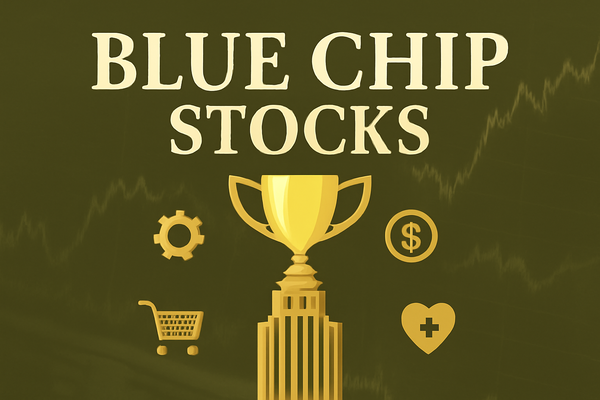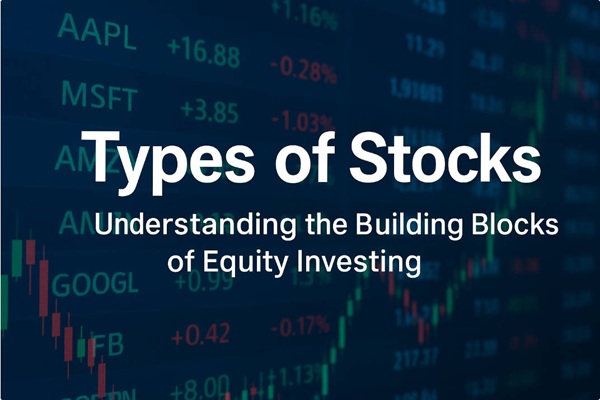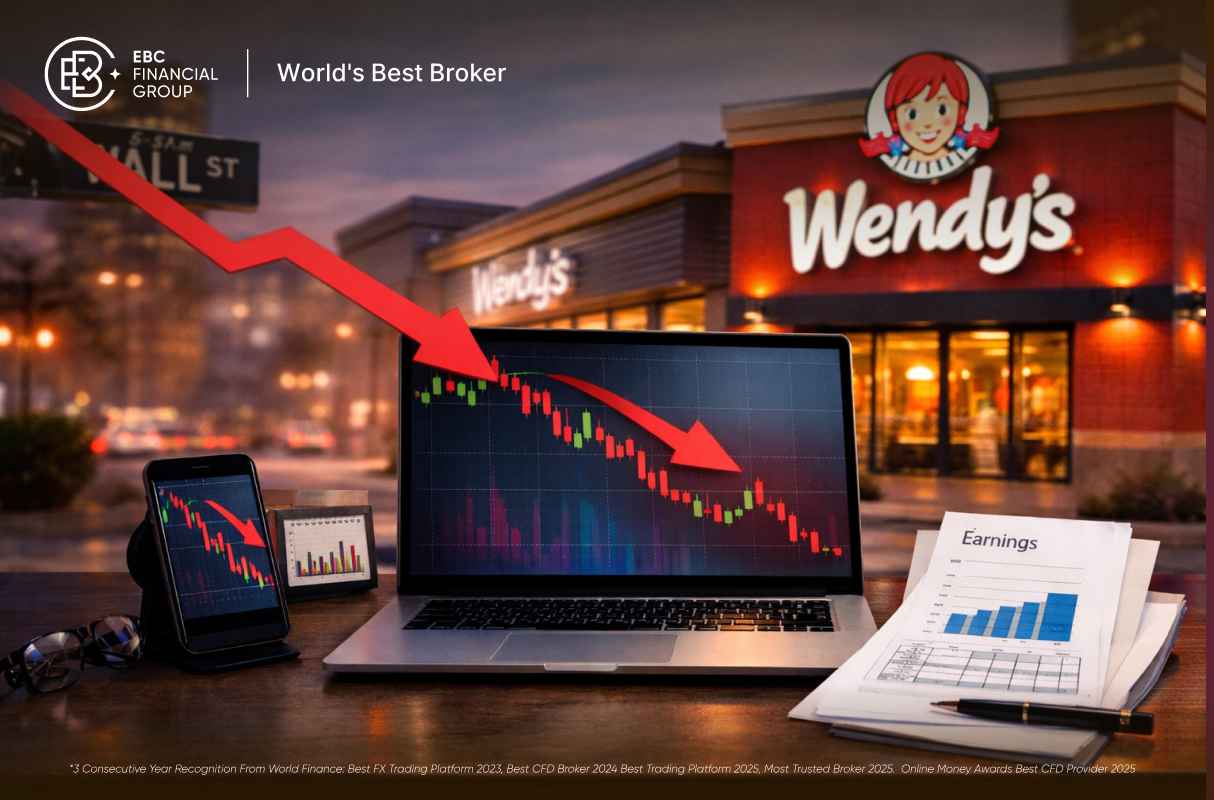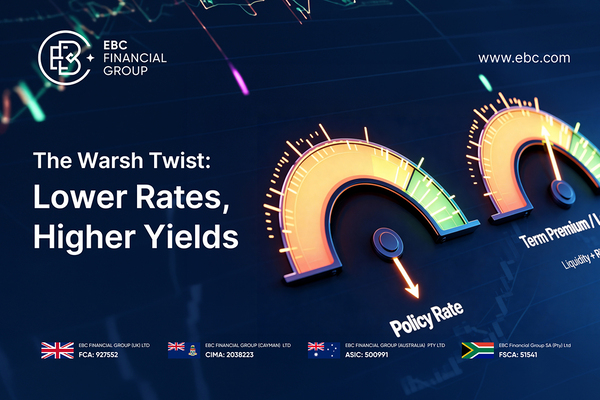In today's market environment, blue chip stocks with reliable dividend payments offer traders and investors a compelling combination of stability and income generation. These established companies have weathered numerous market cycles whilst maintaining their commitment to shareholders through consistent dividend payments.
With the US market showing robust performance and earnings expected to grow by 15% annually, dividend-paying blue chips present attractive opportunities for income-focused portfolios.
What Is A Blue Chip?
A blue-chip stock is a large, financially stable company with a long record of steady earnings, reliability, and consistent dividend payments.
Investors favor blue chips for their proven ability to generate dependable income and preserve capital, even in volatile markets. In essence, they form the backbone of long-term, low-risk investment portfolios.
7 Best Dividend-Paying Blue Chip Stocks
Since there’s no strict definition of blue-chip stocks, this list focuses on large, established companies featured on the S&P 500, NASDAQ 100, or Dow Jones Industrial Average. The following table highlights the current top dividend payers as of October 2025, sorted by yield and overall performance.
| Company |
Dividend Yield (est / recent) |
Approx Market Cap |
Sector |
| Pfizer (PFE) |
~6.94% |
~$139–144 billion USD |
Pharmaceuticals / Healthcare |
| Altria Group Inc. (MO) |
~6.4% |
~$90 billion USD |
Consumer Staples (Tobacco) |
| Realty Income (O) |
~5.46% |
~$54.11 billion USD |
Real Estate Investment Trust (REIT) |
| Target (TGT) |
~5.22% |
~$39.77 billion USD |
Retail / Consumer Discretionary |
| Chevron (CVX) |
~4.44% |
~$259.11 billion USD |
Energy / Oil & Gas |
| Merck (MRK) |
~3.79% |
~$200.6 billion USD |
Pharmaceuticals / Healthcare |
| Coca-Cola (KO) |
~3.05% |
~$290.88 billion USD |
Beverages / Consumer Staples |
1. Pfizer Inc. (PFE)
Dividend Yield: ~6.94%
Market Cap: ~$140 billion
Sector: Pharmaceuticals / Healthcare
Pfizer continues to deliver one of the most attractive dividend yields among major healthcare blue chips. Despite a post-pandemic revenue slowdown, the company’s strong balance sheet and expanding drug pipeline, particularly in oncology and vaccines, support its dividend sustainability.
Pfizer’s high yield also reflects investor caution over near-term earnings, presenting a potentially undervalued opportunity for long-term income investors.
2. Altria Group Inc. (MO)
Dividend Yield: ~6.4%
Market Cap: ~$90 billion
Sector: Consumer Staples (Tobacco)
Altria remains a cornerstone for dividend-focused portfolios, boasting over five decades of consecutive dividend increases. The tobacco leader continues to generate robust cash flow from its cigarette and smokeless tobacco lines while expanding into reduced-risk products such as NJOY e-vapor.
Its consistent dividend policy, even in a declining tobacco market, underscores management’s reliability and disciplined capital allocation.
3. Realty Income Corp. (O)
Dividend Yield: ~5.46%
Market Cap: ~$54 billion
Sector: Real Estate Investment Trust (REIT)
Known as “The Monthly Dividend Company,” Realty Income is a premier REIT with a reputation for dependable income generation. The firm’s diversified real estate portfolio, spanning retail, industrial, and logistics properties has supported uninterrupted monthly dividend payments since 1994.
While sensitive to interest rate changes, Realty Income’s stable tenant base and inflation-linked leases provide resilience across economic cycles.
4. Target Corporation (TGT)
Dividend Yield: ~5.22%
Market Cap: ~$39.8 billion
Sector: Retail / Consumer Discretionary
Target stands as one of the strongest dividend payers in the retail sector, supported by consistent cash generation and a 50-year streak of annual dividend increases.
Although rising costs and tighter consumer spending have pressured margins, the company’s renewed focus on supply chain efficiency and e-commerce integration helps maintain steady shareholder returns. Its yield remains attractive compared to most large-cap retailers.
5. Chevron Corporation (CVX)
Dividend Yield: ~4.44%
Market Cap: ~$259 billion
Sector: Energy / Oil & Gas
Chevron represents a top-tier energy blue chip with a proven record of shareholder returns. The company’s disciplined capital spending, strategic investments in renewables, and share repurchase program strengthen its dividend profile.
Despite exposure to oil price volatility, Chevron’s robust cash flow and low debt levels enable it to sustain and potentially grow dividends, even amid cyclical downturns.
6. Merck & Co., Inc. (MRK)
Dividend Yield: ~3.79%
Market Cap: ~$200.6 billion
Sector: Pharmaceuticals / Healthcare
Merck’s steady dividend growth is powered by its flagship cancer therapy, Keytruda, and a broad vaccine portfolio. The company maintains strong financial health, allowing continued R&D investment while returning capital to shareholders.
Although patent expirations pose long-term risks, Merck’s expanding drug pipeline and operational discipline keep its dividend outlook solid and dependable.
7. Coca-Cola Company (KO)
Dividend Yield: ~3.05%
Market Cap: ~$291 billion
Sector: Beverages / Consumer Staples
Coca-Cola remains a model of dividend stability, having raised payouts for over 60 consecutive years. The beverage giant’s global distribution network and dominant brand portfolio provide consistent cash flow, even in challenging macroeconomic conditions.
While its yield is moderate, Coca-Cola’s defensive business model and reliable dividend growth make it a staple in income and stability-oriented portfolios.
Current Market Context
The US market's robust performance, with a 14% climb over the past year and anticipated 15% annual earnings growth, creates a favourable environment for dividend stocks.
This combination of market strength and earnings growth supports companies' ability to maintain and increase dividend payments whilst providing potential for capital appreciation.
FAQs: Blue-Chip Dividend Stocks (2025)
1.What makes a stock a blue-chip?
A blue-chip stock belongs to a large, financially stable company with a strong reputation, consistent earnings, and a long history of paying dividends. These companies are industry leaders known for weathering market volatility and delivering steady returns over time.
2. Why are blue-chip dividend stocks popular among investors?
Investors favor blue-chip dividend stocks for their combination of reliability, income potential, and lower risk compared to smaller or growth-oriented companies. They offer steady dividends, capital preservation, and long-term compounding benefits.
3. Are blue-chip dividends safe during economic downturns?
Generally, yes. Blue-chip companies tend to have strong cash reserves and resilient business models, allowing them to maintain or even increase dividends during market downturns. However, dividend safety still depends on company fundamentals and debt management.
Conclusion
These seven blue chip dividend stocks represent compelling opportunities for income-focused traders in today's market environment.
The combination of attractive yields, established business models, and proven dividend sustainability makes these blue chips essential considerations for any income-focused portfolio strategy.
Disclaimer: This material is for general information purposes only and is not intended as (and should not be considered to be) financial, investment or other advice on which reliance should be placed. No opinion given in the material constitutes a recommendation by EBC or the author that any particular investment, security, transaction or investment strategy is suitable for any specific person.

























